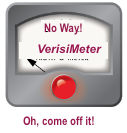My imagined "Verisimeter" (c) looks a bit like the Politifact truth gauge, but with an editor's red pencil in place of the needle. And instead of ranging from "mostly true" to "pants on fire" the gauge would swing from "Oh, come on!" to "Hmmm. Yeah, that works."
 |
| Apologies to Politifact |
"A 1994 federal court ruling in Pennsylvania may have set a precedent that could put Hillary Rodham Clinton in as leader of the free world, according to Huffington Post," says Gloria Christy.
My post from just two days ago (28-May) began with the Tom Clancy quote stating that the difference between fact and fiction was that "fiction has to make sense."
If I were to write HuffPost's above scenario in a future novel, I think my editor's head would explode, along with the heads of my readers if said scenario made it past the draft stage. Moreover, because it's so tenuous, ill-conceived and implausible readers would feel cheated. It screams deus ex machina. Back in the real world, my questions are: a) are there no editors at these publications? is there no one to say "that would/could never happen, spike it;" and b) regarding the current administration and its daily blundering intrigue, who's in charge? Who thought any of what's been happening would play well?
I will be beginning a weekly Verisimeter (trademark pending) test of recent headline stories. I will write the chain of events behind the headlines as they are known or suggested, and then run the whole thing through the Verisimeter, giving it a rating of "Oh, c'mon!" or "Yeah, that could work."
My interest will be purely academic--not whether what's happening is good, or just or wise, and frankly it's a bit late in the day for that, but whether it could withstand scrutiny in the fictional world.
 James McCrone is the author of Faithless Elector, a suspense-thriller, Publishers Weekly calls a “fast-moving topical thriller.” Its “surprising twists add up to a highly suspenseful read.” The sequel, Dark Network, is coming soon. Consent of the Governed will be available next year.
James McCrone is the author of Faithless Elector, a suspense-thriller, Publishers Weekly calls a “fast-moving topical thriller.” Its “surprising twists add up to a highly suspenseful read.” The sequel, Dark Network, is coming soon. Consent of the Governed will be available next year.
Faithless Elector, by James McCrone is available through Amazon.
If you live in Philadelphia, pick up a copy at Head House Books -or- Penn Book Center
If you live in Philadelphia, pick up a copy at Head House Books -or- Penn Book Center



